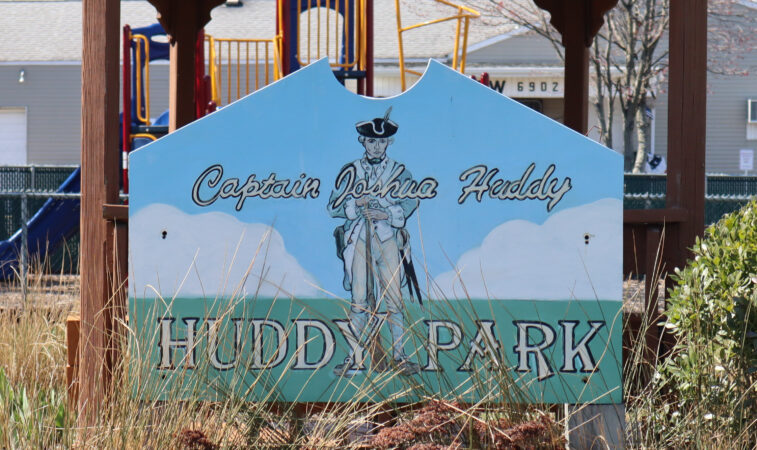Joshua Huddy was a Revolutionary War soldier who became renowned through his untimely death: he was hung by American Loyalists at Highlands in 1782, months after the Battle of Yorktown, the last major military engagement of the war. Patriot outrage over Huddy’s death almost scuttled the peace talks with Britain and nearly cost the life of a young British officer whose hanging in retaliation was averted by last minute French diplomacy.
Although Huddy’s lynching and the subsequent furor are well documented and have often been addressed by historians, there are comparatively few records of Huddy’s life. He was born in Salem County, the oldest of seven brothers, probably on November 8, 1735, to a prosperous family; his grandfather, Hugh Huddy, was a well-known judge. Joshua spent most of his life in Salem, where he owned a 300-acre plantation until the county sold it off to settle his debts.
In his youth, Huddy began to have problems with authority. He was expelled from the Society of Friends when he was in his early twenties for dissolute behavior and he lost substantial property, sold to satisfy debts.
During the American Revolution, committing to the Patriot cause meant sacrificing normalcy and risking life and limb; not everyone was cut out to be a rebel. Indeed, many of the marks of a good revolutionary – a brazen attitude, a willingness to fight, a loathing for arbitrary authority – were anathema to peacetime social convention.
Thus the very same personality traits that got Joshua Huddy expelled from the Society of Friends in 1757 may well have brought him success as a revolutionary leader 25 years later. The Friends, commonly known as Quakers, charged that Huddy “Suffered himself to be Lead [sic] …into Evil and Loose Company and the Corruptions of the world,” tarnishing his reputation and “Raising Scandalous Reports.” Precisely what Huddy did is unknown, but he apparently refused to face the consequences; instead he “Absconded … in a Disorderly manner.” Seeing no other recourse, the Salem Quakers disowned their prodigal son.
Huddy might have been the victim of the rising conservatism of the Quaker Reformation, which began in the 1740s and called for more stringent enforcement of the Quaker code of behavior. But even if he had made amends, he would have eventually been disowned anyway: during the Revolution, New Jersey Quakers expelled anyone who fought for either side.
In Salem, Huddy also proved himself to have a robust constitution; he survived a boating accident in the Delaware, during which he had to swim for three hours to survive. Huddy’s near-drowning, reported in a Philadelphia newspaper, appears all the more striking, the first in a series of larger-than-life adventures. The physical prowess that allowed Huddy to survive alone in the water for three long hours served him well in his career as a captain in the militia and the commander of a privateer. His experience with aquatic escapes no doubt also came in handy in 1780, when he swam to freedom after being captured and taken aboard a Loyalist boat.
With his first wife, Mary Borden, a widow whom he married in about 1764, Huddy had two daughters, Martha and Elizabeth.
Source:
Saretzky, Gary D. (2004). THE JOSHUA HUDDY ERA: Documents of the American Revolution. Catalog of the Exhibition at Monmouth County Library Headquarters, Manalapan, N.J. October, 2004; Revised November 2004. Produced by the Monmouth County Archives. Available: https://www.monmouthcountyclerk.com/archives/events-exhibits/2004-documents-of-the-american-revolution-joshua-huddy-era/


Terrific…right in front of us…all this history….. thanks for bring it to light…